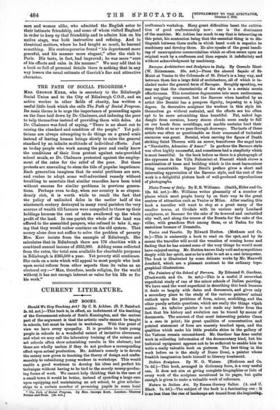CURRENT - LITERATURE.
ART BOOKS.
Should We Stop Teaching Art ? By C. R. Ashbee. (B. P. Batsford. 3s. 6d. net.)—This book is, in effect, an indictment of the teaching of the Government schools of South Kensington, and the central part of the argument is that the artistic crafts cannot be taught in schools, but must be learnt in workshops. With this point of view we have every sympathy. It is possible to train young people in schools to a wonderful extent of imitative cleverness, and what we may call the laboratory training of the science and art schools often show astonishing results in the abstract; but these are wholly useless if they do not produce a corresponding effect upon actual production. Mr. Ashbee's remedy is to devote the money now given to teaching the theory of design and crafts- manship to subsidizing young workers in workshops. This would enable a good workman to develop his ideas and perfect his technique without having to be tied to the merely money-produc- ing forms of work. We cannot help thinking that in the case of a small town it would be better, instead of spending a large sum upon equipping and maintaining an art school, to give scholar- ships to a certain number of promising pupils in some local • he Path of Sociat Press. 133, Mrs. George Kerr. Loudon: Thomas Nelson and Sons. 12s. net.] craftsman's workshop. Many great difficulties beset the cultiva- tion of good craftsmanship now : one is the dominance of the machine. Mr. Ashbee has much to say that is interesting on this point, his contention being that the essential thing is to dis- tinguish between those crafts in which hand work is superior to machinery and develop those. He also speaks of the great handi- cap of unscrupulous commercialism which so often seizes upon an original work by a craftsman and then repeats it indefinitely and without acknowledgment by machinery.


































































 Previous page
Previous page